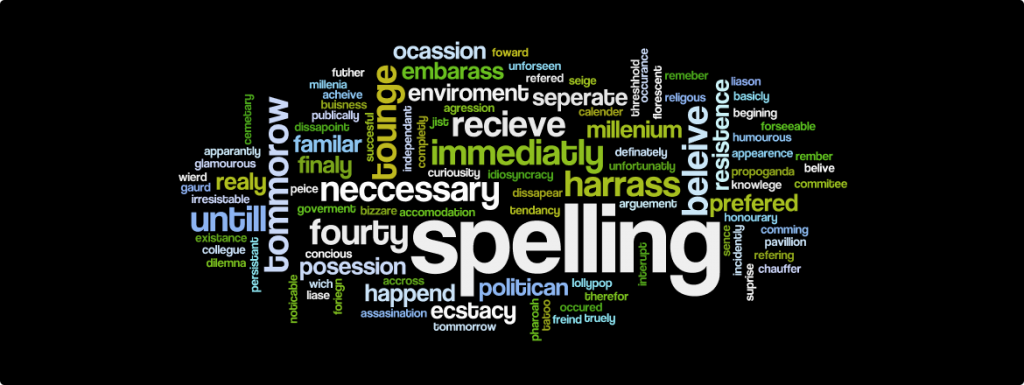Are You Tripping over These 10 Commonly Misspelled Words?
Since the era of Facebook, Tumbler and Instagram started, people have seemingly begun waging wars against grammar, ruining it with wrong sentence construction, fighting it with abbreviations and destroying it with common grammar mistakes.
The truth is it’s always been like this, grammar is just one of the favorite things people like messing up. Even after the most convenient and fast spelling checkers appearance many people still fail to write a pair of sentences so that they would not go blushing red afterward.

A Double-Bobble Trouble: Or Common Grammar Mistakes Importance
Didn’t you know that grammar mistakes can be either annoying and ridiculous? No matter what mistakes you’re prone to do be ready that they can undermine your academic career, attempt to get hired or even turn down a possible dating! Recently several dating studies revealed that 96% of women think good grammar is essential, on dating sites research showed that male profiles with two mistakes found were 14% less successful than their more attentive rivals. Recruiters usually make up their minds about your candidature in less than 60 seconds after glancing at the CV, so it could be something as small as a tiny speck of typo or a spelling mistakes making your resume heading the trash bin immediately.
More than 59% of recruiters actually will reject you as a worthy candidate simply because your grammar isn’t perfect or you make way too much spelling errors, that’s more than half!
The survey, conducted by social media communities of Grammarly aimed to detect the most frustrating grammar mistakes revealed the following results:
Double letters can cause double trouble too, so make sure you write those right! Check the most commonly misspelled words.
- Accommodate
This one is able to accommodate 2 double letters, don’t miss them.
- Possession
Looks like too much of “s”? Nope, it’s ok, spell it correctly.
- Embarrass
Aww, this is indeed embarrassing to forget doubles in this word.
- Committed
Commit to remember the double “t” and “m” from now and forever.
- Misspell
The irony of misspelling that it’s used with the actual misspelling.
There’s even a greater number of other top 100 words that people confuse and misspell frequently, you can take a look at them below:
Words Commonly Misspelled: A Deeper Classification
- Incorrect verb forms
That is the curb that ever the native speakers might trip over because the rules for incorrect verb forms are too hard to grasp quickly. Incorrect verb forms became a great and quite a legal part of dialects worldwide, people use them without even realizing there’s an error. Especially you need to avoid using those at school, university and any kind of formal speech as it will affect your credibility. The vivid example of these is:
- I done vs. I did
Incorrect: I done the homework.
Correct: I did the homework.
- Subject-verb disagreement
The subject should be correctly adjusted to the verb, that is critical for many languages. English does not include the rule where verbs are reflecting the gender, however, your need to pay attention to the number of the subjects instead. The good example is:
Incorrect: The struggles that the horse experiences while climbing the mountain is intense.
Correct: The struggles that the horse experiences while climbing the mountain are intense.
- Run-on sentences
The top bothering people mistake according to research when the sentence contains several independent clauses (a group of words that contains a subject and a verb). The coordinating conjunction should be separated by the comma, don’t neglect this rule. Take a look on the typical mistake:
Incorrect: I enjoy writing immensely but my deadline is looming I am starting to feel overwhelmed.
Correct: I enjoy writing immensely, but my deadline is looming; I am starting to feel overwhelmed.
- Comma splices
In fact, all comma splices are run-on sentences so keep this in mind, here’s the good example for you:
Incorrect: He was very hungry, he ate a whole pizza.
Correct: He was very hungry. He ate a whole pizza.
- Pronoun-antecedent disagreement
Pronoun gets an ambiguous meaning without a clear antecedent, when we use “he” or “she” pronouns, like in this example:
Incorrect: John had a card for Helga but couldn’t deliver it because he was in her way.
Correct: John had a card for Helga but couldn’t deliver it because Tim was in Helga’s way.
Show Me Your Grammar or How to Learn and Fix Your Spelling Effectively
- Be attentive. Observe the way it’s written in the books and other sources, write regularly, find and correct your own mistakes.
- Make a list. Only after you’ve implemented the first step you’ll see the most common mistakes that are particular specifically for you. Now you know your enemies! Next time you write something you’ll know exact words you need to focus on.
- Learn the differences between words. Once you’ve noticed them it will be a whole lot easier for you to memorize. For instance, Your vs You’re. Your is used as a possessive. You’re is the contraction of “you are”.
“Your acne has really cleared up!”
“Thanks! You’re the first person to notice.”
- Develop funny rules. Memorize that a word ending in “y”, drops the “y” and adds “ies” to get plural. If it ends in a vowel, add an “s”.
- Associate. Try to memorize words with the power of imagination, you can relate the image of the particular word to some kind of animal or whatever pops up first in your mind.
Use brief grammar handbooks. There are plenty of sites and helpful services that can help you mastering the grammar and punctuation swiftly. You can use their simple short grammar guiding prompts. Also, don’t forget to run your document through grammar checking tools or use the more profound proofreading service when your document is of greater importance.